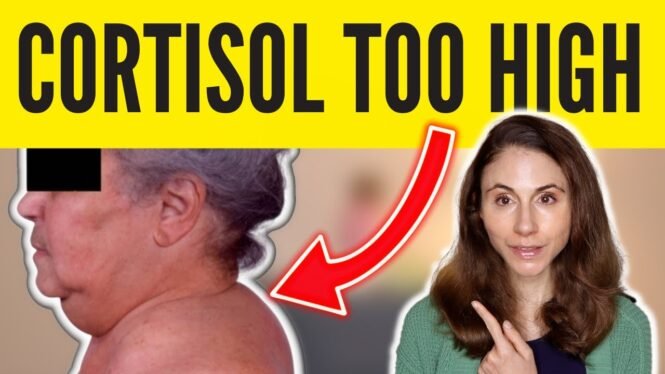Looking for ways to decode your skin and hair’s behavior? If yes, then you might want to know about the warning signs of high cortisol, a hormone that can negatively affect your appearance. In this blog post, we’ll be covering eight signs of high cortisol that can manifest as skin and hair troubles. Dr. Drayzday will help in understanding these signs and learning how to get them under control. So, hold on tight and get ready to discover how cortisol levels affect the way you look!
Introduction:
Cortisol, commonly referred to as the “stress hormone,” is produced by the adrenal gland in response to various physiological and psychological stressors. While cortisol is essential for regulating the body’s response to stress, chronic elevation of cortisol levels can lead to a wide range of health problems, including weight gain, skin thinning, stretch marks, and hair loss, among others. In this article, we will discuss 8 signs of high cortisol that affect the skin and hair, based on a video by dermatologist @DrDrayzday.
- Weight Gain:
One of the most common signs of high cortisol is weight gain, especially around the abdomen area. Cortisol stimulates the breakdown of muscle tissues and increases the production of glucose, which can lead to insulin resistance and ultimately, weight gain.
- Skin Thinning:
Skin thinning is another sign of high cortisol, which can make the skin more susceptible to bruises, injuries, and infections. In @DrDrayzday’s video, she explains that high cortisol levels can cause the dermis layer of the skin to become thinner, leading to a loss of elasticity and sagging skin.
- Stretch Marks and Acanthosis Nigricans:
High cortisol levels can also lead to stretch marks and a skin condition called acanthosis nigricans. Stretch marks occur when there is rapid stretching of the skin, which can happen during pregnancy, weight gain or growth spurts. Acanthosis nigricans manifests as dark patches of skin on the neck, armpits, and other areas.
- Steroid Acne:
Steroid acne is a common side effect of high cortisol levels, which can occur when cortisol activates the sebaceous glands in the skin, leading to excess oil production and acne breakouts.
- Hair Loss and Facial Hair Growth:
High cortisol levels can also lead to hair loss and facial hair growth, especially in women. Cortisol can affect the hair growth cycle, causing hair follicles to enter a resting phase, leading to hair loss. Facial hair growth in women is also common, as cortisol can stimulate the production of androgens, male hormones that promote hair growth.
- Slow Healing and Skin Infections:
Another sign of high cortisol is slow healing and skin infections. Cortisol can suppress the immune system, making it harder for the body to fight off bacterial or fungal infections. Additionally, high cortisol levels can interfere with the production of collagen, which is essential for wound healing.
- @DrDrayzday on Social Media Platforms:
@DrDrayzday is a popular dermatologist on social media platforms, who provides various skincare tips, product reviews and answers to frequently asked questions. She uses her platforms to educate people on different skin conditions and the best way to take care of their skin.
- Consult with a Physician:
It is important to note that @DrDrayzday’s video is not meant to provide medical advice, and it is always essential to consult with a physician for diagnosis and treatment options. The information on her channel is for informational purposes only, and any statements made about specific products are not for diagnosis or treatment purposes.
Conclusion:
High cortisol levels can have various skin and hair-related impacts on the body, including weight gain, skin thinning, stretch marks, acne, hair loss, and slow healing. These signs should be taken seriously, and a physician should be consulted to determine the best course of treatment. Follow along with @DrDrayzday on social media platforms for more skincare tips and product reviews.
FAQs:
-
What causes high cortisol levels?
High cortisol levels can be caused by various physiological and psychological stressors, including anxiety, depression, chronic illness, or medication. -
How can I lower my cortisol levels?
Lowering cortisol levels may involve stress-management techniques like meditation, relaxation techniques, exercise, and healthy eating habits. It is also essential to identify and minimize stressors in your daily life. -
Can high cortisol levels cause mental health problems?
Chronic elevation of cortisol levels can lead to various mental health problems, including anxiety, depression, and mood swings. -
Is there a link between high cortisol and diabetes?
High cortisol levels can lead to insulin resistance, which may increase the risk of developing type 2 diabetes. -
Can cortisol levels be measured?
Cortisol levels can be measured through a blood, urine or saliva test. A physician can determine which test is appropriate for you.

